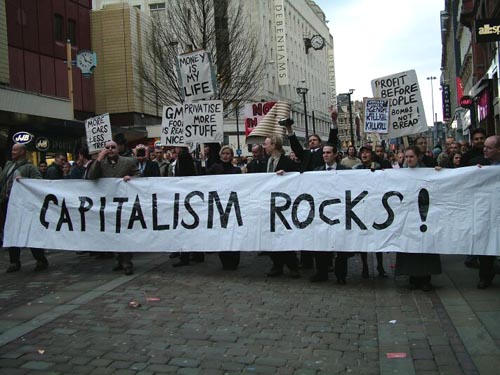 Here at Public Citizen I find that a lot of our detractors espouse a strong dedication to free-market ideologies. I find that this ideology is used to justify a large amount of otherwise irrational behavior, and that its adherents have an unshakable almost religious-like devotion. I find that many espouse the beliefs with a level of certainty which is typically reserved for obvious truths, despite the fact that many of their claims are unsupported as far as I can tell. I would like to look at what I see as some of the flaws in the claims of free market adherents.
Here at Public Citizen I find that a lot of our detractors espouse a strong dedication to free-market ideologies. I find that this ideology is used to justify a large amount of otherwise irrational behavior, and that its adherents have an unshakable almost religious-like devotion. I find that many espouse the beliefs with a level of certainty which is typically reserved for obvious truths, despite the fact that many of their claims are unsupported as far as I can tell. I would like to look at what I see as some of the flaws in the claims of free market adherents.
Currently there are no countries in the developed world, including the United States, that use anything remotely resembling the minimalist government model these men espouse. Even our politicians who have advocated returning to a freer form of capitalism have been shown to reject this notion in practice. Ronald Reagan, who spoke of minimizing the federal government and getting off of people’s back, did the exact opposite in practice and was at the time of his presidency the most protectionist and most business beholden president we have ever had. If you doubt that, just read this piece (from an extremely free market source).
Today the world’s fastest growing developing countries, including China, India, the four Asian tigers (South Korea, Singapore, Hong Kong, and Taiwan), and much of Western Europe, all explicitly reject the tenets of minimal government intervention in their economies. The United States has maintained a substantial public sector and as well as a high level of government involvement in research and development of new technology through the military and university systems since the Great Depression.
In fact many of our most impressive technologies came from government (US or foreign) sponsored projects (these include the internet, fiber-optics, microprocessors, satellites, sonar, nuclear power for better or worse, and many others). Much of this technology had little if any market incentive for its creation. Other developed countries, such as those in Western Europe, have governments that play a much more expansive role in their economies and have out-performed us in many areas from economic growth and social mobility to educational attainment and personal happiness per capita. None of this should be the case if the free-market advocates are correct.
Their position is made even more untenable when we note that many countries in the developing world have undergone various neo-liberal structural adjustment programs sponsored by the World Bank or the International Monetary Fund. These programs gave third world countries development funds provided that they open their borders up to foreign trade and minimized government involvement in the economy. So far these programs have not produced many success stories, and many countries have been left worse off.
This is not surprising when one takes into account the fact that the U.S began seeing unprecedented economic growth and stability, as well as improvements in quality of life after the expansion of government involvement in the economy during the New Deal era.
This is largely dismissed by the free-market purists, who consider the Gilded Age as the golden era of American capitalism. They point to this era’s lack of government intervention in the economy and the success of success of businessmen like John D. Rockefeller and James J. Hill as models of entrepreneurs who gained great profits without government intervention. The problem is that the desirability of an economic system is not determined by whether or not a handful of businessmen are able to make a profit. It is determined by the quality of life for the people living under it. Unfortunately this ways a time of extreme economic inequality, instability (there were 8 complete business cycles between the Civil War and WWI), child labor, and poor sanitation. This golden age of capitalism produced the conditions described in the writings of Upton Sinclair and Charles Dickens, and was generally seen as difficult time for the general population. It was the horrible social conditions during this time as well as the Depression of the thirties that sparked the increase in government involvement in the economy that characterized the majority of the twentieth century.
As mentioned earlier, none of this should be true if the claims of the free-marketers are correct. I am making these arguments solely to show that there is a lot of evidence that contradicts the claims made by free-market absolutists. My purpose is not to advocate different kinds of government intervention, but show that the free-market ideology presents a grossly over simplified view of how economies work. Unlike free-market ideologues, I don’t claim to know what the best types of economic policies are or what the appropriate role of the government is.
While there truly are people who believe in the free-market rhetoric, I suspect that more than anything else it has served as a way of framing economic policies that benefit economic elites at the expense of the rest of the population. This explains why Reagan preached ending protectionism while increasing tariffs and import quotas to benefit his friends in industry. The only government programs that were striped in the name of minimizing government inference were those intended to benefit the poor and working class. This trend of course continued through the administrations of Clinton and the two Bushes.
–Public Citizen Texas’ newest intern, “The Disappointed Environmentalist”


